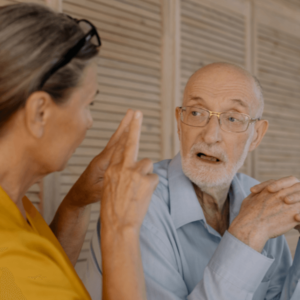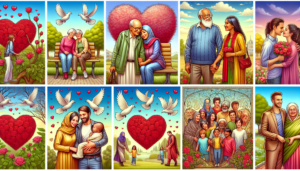Love is a deeply personal emotion, and the way individuals define and experience it is influenced by their unique life journeys. Personal experiences — whether they come from family relationships, romantic partnerships, friendships, or individual growth — shape how we view and understand love. The way we give, receive, and interpret love is largely shaped by these interactions and can differ dramatically from one person to another.
In this article, we’ll explore how personal experiences influence individuals’ definitions of love, touching on the impact of early relationships, romantic experiences, self-love, and cultural backgrounds.
- Introduction
- The personal nature of love and its diverse definitions.
- Why experiences shape our understanding of love.
2. Early Relationships: The Role of Family
- How childhood experiences influence one’s definition of love.
- The impact of parental affection and family dynamics on understanding love.
3. Romantic Experiences: Passion and Heartache
- How past romantic relationships shape one’s view of love.
- The role of both positive and negative romantic experiences.
4. Friendships and Platonic Love
- How friendships help define the non-romantic aspects of love.
- The importance of trust, loyalty, and support in shaping one’s perception of love.
5. Self-Love: Personal Growth and Acceptance
- How personal growth and experiences of self-love influence one’s definition of love.
- The connection between self-love and how we engage with others.
6. Cultural and Social Influences on Love
- The role of cultural norms and societal expectations in shaping one’s experience of love.
- How different communities influence individual interpretations of love.
7. Final Thought.
- The importance of recognizing the impact of personal experiences on love.
- How understanding these influences can lead to healthier, more empathetic relationships.
1. Introduction: The Personal Nature of Love and Its Diverse Definitions
Love is often regarded as a universal emotion, yet no two people define or experience it in exactly the same way. Our personal experiences play a significant role in shaping how we understand love, from our earliest interactions with family members to the romantic relationships we form as adults. The way we interpret love is a reflection of our emotional development, shaped by life events, personal values, and the connections we build with others.
Because love is influenced by these diverse experiences, it takes on many forms and meanings. Understanding how personal experiences shape our definitions of love can provide valuable insights into how we connect with others and navigate relationships.
2. Early Relationships: The Role of Family
How Childhood Experiences Influence One’s Definition of Love
The earliest relationships we form, particularly with family members, have a profound influence on how we define love. From birth, we are exposed to expressions of affection, care, and support from parents, siblings, and extended family members. The way we are treated as children shapes our emotional understanding of love and lays the foundation for how we give and receive love later in life.
Children raised in nurturing, affectionate environments often grow up with a strong sense of security and emotional well-being. They learn that love is about care, support, and trust. Conversely, individuals who experience neglect, emotional distance, or conflict within their families may develop more complex, or even negative, views of love.
- Example: A person who grew up in a household where love was expressed openly and consistently through hugs, words of affirmation, and acts of kindness may define love as a feeling of warmth, security, and emotional closeness.
The Impact of Parental Affection and Family Dynamics on Understanding Love
The dynamic between parents or caregivers and children plays a critical role in shaping one’s perception of love. Children who receive consistent affection, attention, and validation from their parents are likely to develop a healthy understanding of love, viewing it as a source of comfort and belonging. On the other hand, individuals who grow up in environments where love is conditional or inconsistent may struggle with feelings of insecurity or a fear of abandonment in their future relationships.
Family dynamics, such as the way conflicts are resolved or the expectations placed on family members, also influence one’s understanding of love. For instance, individuals raised in highly structured or authoritarian families may define love as obedience or duty, while those raised in more open, communicative environments may see love as mutual respect and emotional expression.
3. Romantic Experiences: Passion and Heartache
How Past Romantic Relationships Shape One’s View of Love
Romantic relationships are often the most intense and emotionally charged experiences of love. These relationships can bring profound joy and fulfillment, but they can also introduce heartache, disappointment, and emotional challenges. Each romantic experience contributes to shaping how individuals define love, whether they view it as passionate and exhilarating or stable and nurturing.
- Example: Someone who has experienced a deeply passionate relationship may associate love with intense emotional and physical attraction, while another person who values stability may define love as a steady, consistent bond built on trust.
The Role of Both Positive and Negative Romantic Experiences
Both positive and negative romantic experiences play a role in shaping one’s definition of love. Positive relationships, where love is reciprocated and nurtured, often reinforce feelings of security, trust, and emotional intimacy. However, negative experiences — such as betrayal, heartbreak, or unrequited love — can lead individuals to view love as fragile or even painful.
Over time, people’s experiences in romantic relationships help refine their understanding of love. Those who experience heartbreak may develop a more cautious or guarded approach to love, while others who find enduring, healthy relationships may see love as a source of personal growth and happiness.
4. Friendships and Platonic Love
How Friendships Help Define the Non-Romantic Aspects of Love
Friendships offer a different perspective on love, one that is based on trust, loyalty, and emotional support without the complexities of romantic involvement. Platonic love is often just as meaningful as romantic or familial love, and for many people, friendships provide the foundation for emotional well-being and social connection.
Through friendships, individuals learn the importance of reliability, understanding, and unconditional support. These relationships can shape how we view love in broader contexts, showing us that love is not only about romance but also about mutual respect, companionship, and care.
- Example: A person who has strong, supportive friendships may define love as a deep, emotional connection that isn’t necessarily tied to physical attraction or romantic desire.
The Importance of Trust, Loyalty, and Support in Shaping One’s Perception of Love
In friendships, love is often expressed through acts of loyalty, emotional availability, and consistent support. Individuals who have experienced long-lasting, fulfilling friendships are more likely to define love as a partnership where both parties invest in each other’s well-being. These non-romantic expressions of love help people recognize that love can exist in various forms and be just as meaningful in platonic relationships.
5. Self-Love: Personal Growth and Acceptance
How Personal Growth and Experiences of Self-Love Influence One’s Definition of Love
Self-love is an essential aspect of personal growth and emotional well-being. Individuals who practice self-love learn to appreciate their own worth, embrace their strengths and weaknesses, and prioritize their mental and emotional health. Experiences of self-love shape how people define love, as they come to understand that love begins with the relationship they have with themselves.
- Example: A person who has overcome self-doubt and learned to practice self-love may define love as a process of acceptance and personal growth, rather than as something that relies on external validation.
The Connection Between Self-Love and How We Engage with Others
People who develop a strong sense of self-love are often better equipped to engage in healthy, balanced relationships with others. They are less likely to seek validation or approval from others and more likely to recognize the importance of mutual respect and emotional boundaries in their relationships. Self-love also allows individuals to approach love with confidence, knowing that they are worthy of receiving love and capable of giving it in return.
6. Cultural and Social Influences on Love
The Role of Cultural Norms and Societal Expectations in Shaping One’s Experience of Love
Cultural norms and societal expectations play a significant role in how individuals experience and interpret love. In some cultures, love is expressed through public displays of affection and verbal affirmations, while in others, love may be demonstrated through quiet acts of service, loyalty, or duty. These cultural influences shape individuals’ definitions of love and the way they express it in their relationships.
- Example: In collectivist cultures, love is often seen as a commitment to family and community, with an emphasis on duty and responsibility. In contrast, individualistic cultures may emphasize personal fulfillment and emotional connection as central components of love.
How Different Communities Influence Individual Interpretations of Love
Communities and social environments also shape how love is understood and practiced. The way love is discussed, portrayed in media, or celebrated in religious and social rituals can influence how individuals define and express love. For instance, love may be viewed as a spiritual connection in religious communities, while in secular societies, it may be seen more as a personal or emotional bond.
7. Final Thought: The Importance of Recognizing the Impact of Personal Experiences on Love
Love is a deeply personal emotion, and the way we define and experience it is shaped by the unique experiences we encounter throughout our lives. From early family relationships to romantic encounters, friendships, and self-discovery, personal experiences play a significant role in how we view and understand love.
By recognizing the impact of these experiences, we can gain a deeper appreciation for the diverse ways people interpret love and approach relationships. This understanding can help us build healthier, more empathetic connections with those around us, fostering deeper bonds and greater emotional fulfillment




